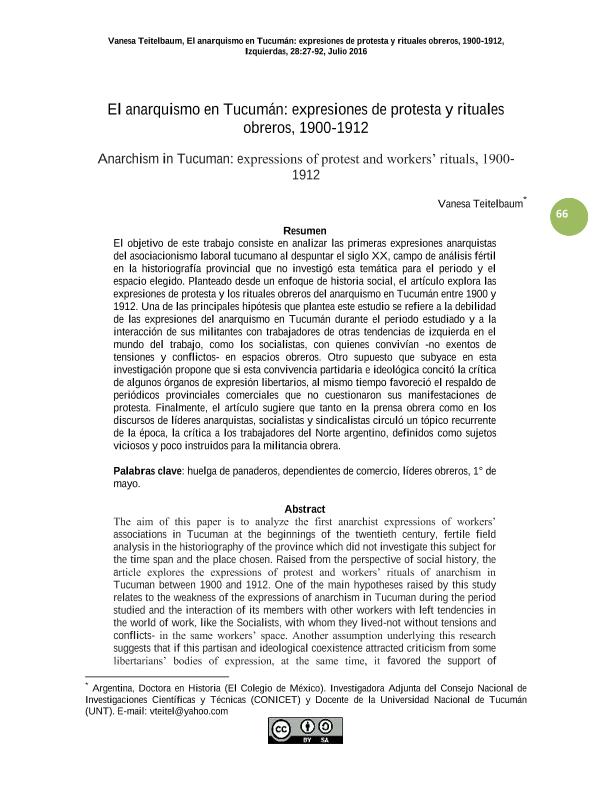Artículo
El objetivo de este trabajo consiste en analizar las primeras expresiones anarquistas del asociacionismo laboral tucumano al despuntar el siglo XX, campo de análisis fértil en la historiografía provincial que no investigó esta temática para el periodo y el espacio elegido. Planteado desde un enfoque de historia social, el artículo explora las expresiones de protesta y los rituales obreros del anarquismo en Tucumán entre 1900 y 1912. Una de las principales hipótesis que plantea este estudio se refiere a la debilidad de las expresiones del anarquismo en Tucumán durante el periodo estudiado y a la interacción de sus militantes con trabajadores de otras tendencias de izquierda en el mundo del trabajo, como los socialistas, con quienes convivían –no exentos de tensiones y conflictos– en espacios obreros. Otro supuesto que subyace en esta investigación propone que si esta convivencia partidaria e ideológica concitó la crítica de algunos órganos de expresión libertarios, al mismo tiempo favoreció el respaldo de periódicos provinciales comerciales que no cuestionaron sus manifestaciones de protesta. Finalmente, el artículo sugiere que tanto en la prensa obrera como en los discursos de líderes anarquistas, socialistas y sindicalistas circuló un tópico recurrente de la época, la crítica a los trabajadores del Norte argentino, definidos como sujetos viciosos y poco instruidos para la militancia obrera. The aim of this paper is to analyze the first anarchist expressions of workers' associations in Tucuman at the beginnings of the twentieth century, fertile field analysis in the historiography of the province which did not investigate this subject for the time span and the place chosen. Raised from the perspective of social history, the article explores the expressions of protest and workers' rituals of anarchism in Tucuman between 1900 and 1912. One of the main hypotheses raised by this study relates to the weakness of the expressions of anarchism in Tucuman during the period studied and the interaction of its members with other workers with left tendencies in the world of work, like the Socialists, with whom they lived-not without tensions and conflicts- in the same workers' space. Another assumption underlying this research suggests that if this partisan and ideological coexistence attracted criticism from some libertarians' bodies of expression, at the same time, it favored the support of commercial provincial newspapers that did not question their protests. Finally, the article suggests that both the working press as well as the leading anarchists' speeches of socialists and trade unionists circulated a recurring topic of the time, criticism of the workers in the North of Argentine, who were defined as vicious and uneducated subject for worker's militancy.
El anarquismo en Tucumán: expresiones de protesta y rituales obreros, 1900-1912
Título:
Anarchism in Tucuman: expressions of protest and workers’ rituals, 1900-1912
Fecha de publicación:
06/2016
Editorial:
Universidad de Santiago de Chile. Instituto de Estudios Avanzados
Revista:
Izquierdas
ISSN:
0718-5049
Idioma:
Español
Tipo de recurso:
Artículo publicado
Clasificación temática:
Resumen
Archivos asociados
Licencia
Identificadores
Colecciones
Articulos(ISES)
Articulos de INST.SUPERIOR DE ESTUDIOS SOCIALES
Articulos de INST.SUPERIOR DE ESTUDIOS SOCIALES
Citación
Teitelbaum, Vanesa Ester; El anarquismo en Tucumán: expresiones de protesta y rituales obreros, 1900-1912; Universidad de Santiago de Chile. Instituto de Estudios Avanzados; Izquierdas; 28; 6-2016; 66-93
Compartir
Altmétricas




